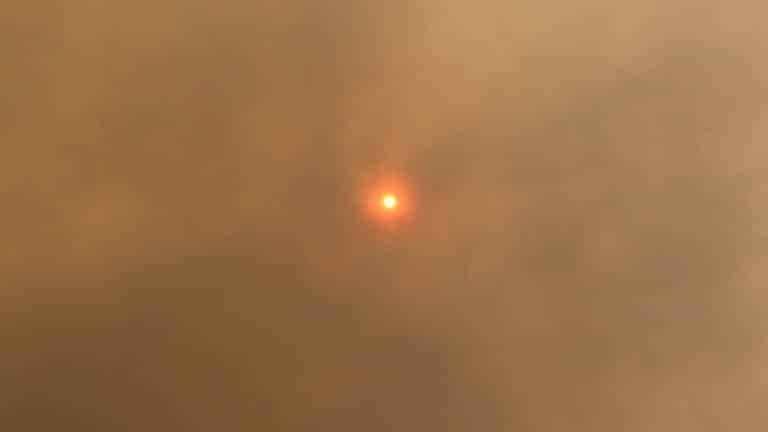
We know that smoking cigarettes has a long-term damaging effect on our lungs, so what about the smoke haze?
Dr Steven Maltby, Respiratory Researcher and Executive Officer for the Centre of Excellence in Severe Asthma at the Hunter Medical Research Institute and the University of Newcastle

The challenges the nation is facing with extreme bushfires not only threaten homes, lives, bushland and animals, it can have a lasting impact on our health.
The horizon has been smothered in smoke for the past few weeks. We gaze at a red sun through a smoky haze that is unprecedented.
This smoke, however, is having an impact on our breathing – and our respiratory health.
Experts have warned people to stay indoors with doors and windows sealed. Any strenuous or vigorous exercise is a no-go while the smoke hangs in the atmosphere. This advice is particularly important for people with existing lung disease, such as asthma and COPD (chronic obstructive pulmonary disease).
We know that smoking cigarettes has a long-term damaging effect on our lungs, so what about the current smoke haze that hangs in the air?
We have seen catastrophic asthma outcomes caused by weather events. A few years ago, the nation experienced a spate of unexpected deaths from ‘Thunderstorm Asthma’. Pollens exploded into the atmosphere, combined with high wind flow and rain and led to a spike in asthma attacks causing deaths, particularly in those who had never been diagnosed with asthma.
Smoke also affects our lungs as the small particles suspended in the air enter our nose and mouth and descend into our airways when we breathe.
This can cause inflammation, as the body interprets the particles as invaders that need to be fought off. This inflammation is meant to protect our body for sickness. Unfortunately, in a cruel twist of fate, this inflammation instead damages the lung tissue, causing ongoing lung disease. This is currently a life-long disease, with no cure and often treatment is often only partially successful.
People with a respiratory condition such as asthma or COPD are particularly affected by the smoky conditions, which can trigger disease attacks and hospitalisations.
Patients report that these symptoms interfere with their ability to live their normal life, engage with friends and family and maintain employment. People with these conditions should consider seeking the advice of their healthcare provider to look into updating any medications to help control the condition and to prevent any attacks.
The current challenge is that this persistent smoke is also affecting people without pre-existing conditions.
This is why researchers are continually striving to understand the disease processes that cause asthma and how environmental exposure can worsen disease and trigger attacks.
Knowledge gained can inform better management approaches and more personalised and targeted treatment options.
This week, respiratory research leaders from around the country visited Newcastle for the Centre of Excellence in Severe Asthma Annual Research Day to share their insights and forge research collaborations to help communities breathe easier.
Talks focused on severe asthma and featured new evidence on understanding and managing disease, new resources that are available and digital health technologies and long-term population studies.
These included discussion of The Severe Asthma Toolkit, which is a dedicated and first-of-its-kind website to help raise awareness of severe asthma, provide evidence-based data on management and clinical resources.
These findings will spark conversations to improve our understanding of severe asthma and treatment approaches, and ultimately improve health for people with lung disease.
The centre also hosted a public event at Newcastle Museum. At this event a website was launched on HealthTalk Australia, that communicates the real life experience people with severe asthma face daily. Presenting interviews with people who have severe asthma, this resource allows new research knowledge to be effectively shared with the community.
We’ve come a long way over the past 30-50 years in understanding the complexity of respiratory disease. This has resulted in dramatic improvements in quality of life and reduced deaths from asthma. These improvements have not translated to all populations and people with severe asthma continue to have a major disease burden.
With recent bushfires and climate change worsening air pollution, it is critical that we gain a better understanding to help people with lung disease.
HMRI would like to acknowledge the Traditional Custodians of the land on which we work and live, the Awabakal and Worimi peoples, and pay our respects to Elders past and present. We recognise and respect their cultural heritage and beliefs and their continued connection to their land.

Hunter Medical Research Institute
We’re taking healthy further.
Locked Bag 1000
New Lambton
NSW, Australia, 2305



This site is protected by reCAPTCHA and the Google Privacy Policy and Terms of Service apply.
Copyright © 2024 Hunter Medical Research Institute | ABN: 27 081 436 919
Site by Marlin Communications
